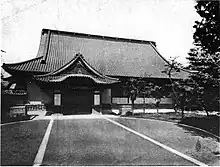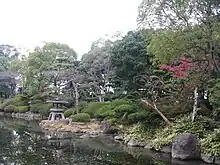

The Tenrinkaku (天臨閣) was a shoin structure at Osaka Castle. It was initially known as the Kishū Palace (紀州御殿 Kishū Goten).[1][2][3][4]
History
The Ninomaru Palace of Wakayama Castle was constructed in Genwa 7 (1621) shortly after the Momoyama period.[1]
The Honmaru Palace of Osaka Castle was destroyed by fire during the Boshin War in Keio 4 (1868).[2]
Various structures from the Wakayama Castle Ninomaru Palace such as the Hakushoin, Kuroshoin, and Tozamurai were transferred to Osaka Castle Honmaru in Meiji 18 (1885).[5] Named the Kishū Palace due to its origin, it served as the administrative centre for the army's 4th Division's administrative centre beginning in Meiji 21 (1888).[1][6]
It served as the Osaka City State Guest House. A Japanese garden was also created at that time that included the tsuru no ike (Crane Pond). Emperor Meiji stayed here.[2] Emperor Shōwa stayed there in Shōwa 7 (1932). The Kishū Palace was renamed Tenrinkaku in Shōwa 8 (1933).[1][2]
It was destroyed on September 22, Shōwa 9 (1947) in a fire.[1][2]
See also
References
- 1 2 3 4 5 "【和歌山城再発見】<2>二ノ丸と紀州御殿". 産経ニュース (in Japanese). 2022-07-22. Retrieved 2023-10-23.
- 1 2 3 4 5 "大阪城「本丸御殿跡・紀州御殿跡」のアクセスとその歴史". osaka-castle.net. Retrieved 2023-10-23.
- ↑ "大阪城天守閣前広場" (PDF). www.mlit.go.jp (in Japanese). Retrieved 22 October 2023.
- ↑ 国立国会図書館. "大阪城の紀州御殿は1947年9月12日に焼失したそうだが、そのことについて詳しく書かれた資料はあるか..." レファレンス協同データベース (in Japanese). Retrieved 2023-10-23.
- ↑ myamato10. "紀州御殿". 紀州よいとこ (in Japanese). Retrieved 2023-10-23.
{{cite web}}: CS1 maint: numeric names: authors list (link) - ↑ "大阪城の近代 〜兵隊と器〜(大坂城豊臣石垣コラム|太閤なにわの夢募金)". 太閤なにわの夢募金 (in Japanese). Retrieved 2023-10-23.
External links
 Media related to Tenrinkaku at Wikimedia Commons
Media related to Tenrinkaku at Wikimedia Commons